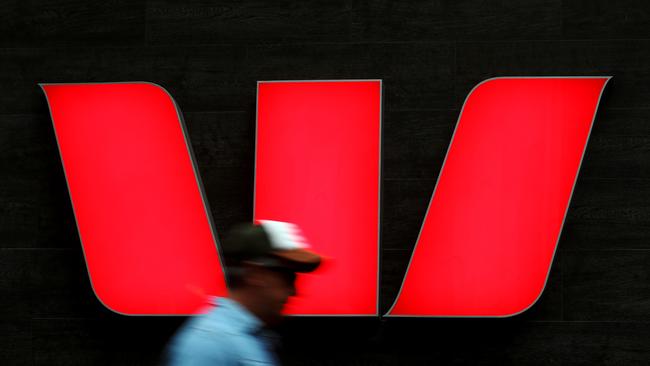Westpac defers dividend after half-year cash profit crashes 70%
Westpac’s 37 year unbroken run of dividends is under threat after it deferred returns as half-year cash profit crashed 70 per cent.

Westpac has become the second major bank to defer a decision on dividends, as cash profit plummeted 70 per cent amid the COVID-19 economic turmoil and it labelled the result the “most difficult” in many years.
The bank posted a 70 per cent decline in interim cash net profit to $993m for the six months ended March 31, compared to the same period a year earlier, it reported in an ASX statement on Monday.
Last week, National Australia Bank slashed its dividend to 30c per share from 83c six months earlier, while ANZ didn’t declare a dividend and deferred a decision until August.
The banking regulator last month urged banks to seriously consider postponing making a decision on dividends or materially reducing the payments, to enable more capital conservation during the COVID-19 crisis.
Westpac said deferring an announcement on a dividend “was a difficult decision given many retail shareholders rely on Westpac dividends”.
A year ago, the bank declared an interim dividend of 94c per share, before cutting that to 80c for its second half. The bank has paid two dividends every year since 1983, including when it almost collapsed in the early nineties.
“We must remain prudent at this point in time. The board will continue to review the dividend options over the course of this year,” the bank said in an email to shareholders on Monday.
On the dividend, chief executive Peter King told analysts and journalists: “This is the prudent decision in the current uncertain environment”.
He said it was the “most difficult” result Westpac had delivered in many years, as it prepared for a sharp economic contraction linked to the pandemic.
“Westpac’s balance sheet remains strong. Customer deposits were up $19bn over the half, more than funding loan growth which increased by $5bn. The deposit to loan ratio is now over 75 per cent,” Mr King added in the statement.
“We are well capitalised and our liquidity and funding metrics are comfortably above regulatory requirements. In light of the changed economic outlook we have increased Westpac’s provisions for expected credit losses to $5.8bn, which includes approximately $1.6bn of additional impairment charges predominantly related to COVID-19 impacts.”
Westpac’s shares declined in early Monday trading before rallying in the afternoon to be 1.6 per cent higher at $15.58.
Citigroup analysts questioned some of the bank’s modelling in the results presentation, particularly around estimated loan losses.
“Similarly to peers, losses look light relative to economic assumptions but risk weight migration is a large consumer of capital over two years,” they said.
“Unlike ANZ which saw capital consumed by lending, Westpac’s decision to defer the dividend appears to reflect the leanness of their risk weights. “
Westpac expects Australia’s economic output to contract 8.2 per cent in the year ended June 30, but finish calendar 2020 down 5 per cent before recovering to 4 per cent growth the following year.
The bank anticipates that unemployment will peak at 8.8 per cent this year, while property prices will slump 15 per cent.
Mr King also announced a sweeping strategic review of Westpac’s superannuation, platforms and insurance businesses, which suggests the divisions may be sold.
Westpac’s statutory profit fell 62 per cent to $1.19bn for the half. Analysts had expected Westpac to report an interim profit of about $1.38bn.
The bank’s return on equity tumbled to 2.9 per cent, from 10.4 per cent a year ago. Excluding notable items the return on equity printed at 6.7 per cent.
Westpac’s net interest margin - what it earns on loans less funding and other costs - edged up one basis point to 2.13 per cent, from the same period a year ago and was steady from six months ago.
Net interest income rose 3 per cent while non-interest income, which reflects fees, fell 2 per cent. The bank’s operating expenses climbed 22 per cent in the first-half, compared to a year earlier.
Westpac is also treading cautiously on the economic outlook and warning of a tough period ahead, against the backdrop of most economists expecting Australia to be hit by a recession.
Mr King said the remainder of the year “will be challenging”.
“Australia still faces a sharp economic contraction in 2020 with a solid rebound not expected until the December quarter,” he added.
“Our economists believe the unemployment rate will peak at 9 per cent in June but would have been much higher in the absence of the JobKeeper Payment. We forecast the rate to drop to around 7 per cent by the end of the year.
“Business and consumer confidence have fallen sharply. A sustained recovery cannot be expected until the December quarter, although we expect caution to prevail well into 2021.”
In the past four weeks, Westpac outlined impairment and other charges of $2.23bn pre-tax on its earnings, including a $1.6bn hit related to expected COVID-19 loan losses. An additional $1.43bn in after-tax writedowns and provisions was also disclosed, including the $900m it put aside for an anticipated financial crimes penalty.
Austrac launched legal action against the bank in November over 23 million alleged breaches of anti-money laundering laws, including links to financing child exploitation. The court action led to the departure of former CEO Brian Hartzer and brought forward the retirement of former chairman Lindsay Maxsted.
The bank’s common equity tier one capital ratio printed at 10.8 per cent for its half year, above the banking regulator’s “unquestionably strong” threshold.
Westpac’s four business units all posted lower cash earnings in the first half, with the institutional bank’s result tumbling 68 per cent versus a year earlier. The consumer bank had the least biggest decline with earnings down 14 per cent.
Westpac rounds out the earnings reporting season for the three big banks with a September 30 year end, with Commonwealth Bank provides a third quarter update next week.
The bank’s strategic review, will centre on whether it should remain in its wealth platforms, superannuation and retirement products, investments, general and life insurance and auto finance units.
“We have several businesses where we don’t have sufficient scale or where the returns are insufficient for the risk,” Mr King said. “These businesses will be moved into a new Specialist Businesses division. Jason Yetton has been appointed chief executive, Specialist Businesses, and will commence the new role on 18 May 2020.
“Our Westpac Pacific business will also be managed in this division to simplify the Institutional bank portfolio. “Mr Yetton rejoins Westpac after several years away running SocietyOne and then Commonwealth Bank’s mortgage broking and wealth businesses that it has flagged for divestment.
The Australian last year revealed that Westpac had tapped JPMorgan to consider a sale of its life insurance division.








To join the conversation, please log in. Don't have an account? Register
Join the conversation, you are commenting as Logout